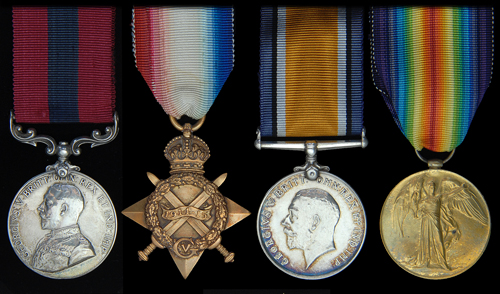
Auction: 8016 - Orders, Decorations, Medals & Militaria
Lot: 77
A Rare and Early Great War 1915 ´Mesopotamian Theatre´ D.C.M. Group of Four to Corporal R. Parks, Oxfordshire and Buckinghamshire Light Infantry, For the Dawn Raid on the Turkish Camp at Ahwaz a) Distinguished Conduct Medal, G.V.R. (9166 L. Cpl. R. Parks. 1/ O.&B.L.I.) b) 1914-15 Star (9166 Cpl. R. Parks. Oxf: & Bucks: L.I.) c) British War and Victory Medals (9166 T. Cpl. R. Parks. Oxf. & Bucks. L.I.), minor edge bruise to first, generally good very fine (4) Estimate £ 1,200-1,400 D.C.M. London Gazette 3.6.1915 9166 Lance-Corporal Parks, R., 1st Battalion, Oxfordshire and Buckinghamshire Light Infantry ´´For conspicuous gallantry near Ahwaz (Turkey in Asia) on 3rd March, 1915, where he displayed great devotion to duty in attending on the wounded in the open, under heavy shell and rifle fire, and for protecting them with his own rifle fire from the assaults of the enemy.´´ M.I.D. London Gazette 5.4.1916 No.9166 Lance-Corporal L.C. Parkes [sic], Oxfordshire and Buckinghamshire Light Infantry ´´For services in connection with the operations in Mesopotamia from 6th November 1914, up to 14th April 1915.´´ 9166 Corporal Reginald Parks, D.C.M., served with the 1st Battalion, Oxfordshire and Buckinghamshire Light Infantry in the Mesopotamian Theatre of War from 5.12.1914 Action near Ahwaz On the 2nd March, 1915, General Robinson, who was encamped with his force on the right bank of the Karun River, received news that two separate bodies of the enemy in the area were about to join forces in order to launch an attack. The Turkish force with some of their Arab allies was in camp about ten miles to the north-west of Ahwaz, and Ghazban of the Bani Lam, together with the Bani Turuf, were making their way to the camp. General Robinson decided to strike a blow to the Turkish camp before their supporters could join them, convinced that if the Allied guns could be brought to bear on the enemy camp, then the enemy would retire or disperse. At 2:00 am on the morning of the 3rd March, the advance force moved out of the Allied camp. An hour before sunset the force reached a point six thousand yards from the enemy camp, and as soon as there was sufficient light the British guns opened fire. At once large bodies of Arabs poured out of the camp, moving towards the British right, and along the British left. The flank guards became so heavily engaged that it became necessary to retire them; this left the centre dangerously exposed, and they were also forced to retire. The simultaneous retreat of the whole of the infantry nearest to the enemy resulted in confusion, with the fighting continuous and close, and many casualties were sustained. The situation was critical in the extreme, for the enemy were approaching the British camp in ever increasing numbers. General Robinson ordered a final all-out attack. The cavalry succeeded in closing the enemy in, who were then driven off at the point of the bayonet. It later transpired that the two separate bodies of the enemy had joined forced the previous night, and were planning their own dawn raid on the British. British losses amounted to 62 killed and 127 wounded; enemy losses were between two and three hundred killed, and about 600 wounded. Owing to this the enemy made no further attempts on the British camp at Ahwaz. In considering this and other engagements with the Arabs it is important to remember their extraordinary mobility. When mounted they could always outpace British cavalry, and even when dismounted their fleetness of foot more than enabled them to hold their own. The experience of an Indian cavalry officer illustrates the point well. After being cut off in an action in the desert, and although he was mounted on a polo pony which had been a reserve mount in the recent international polo match with America, he found that the Arabs on foot could outpace him, and it was only the intervention of British Artillery that enabled him to make good his escape.
Sold for
£1,800




